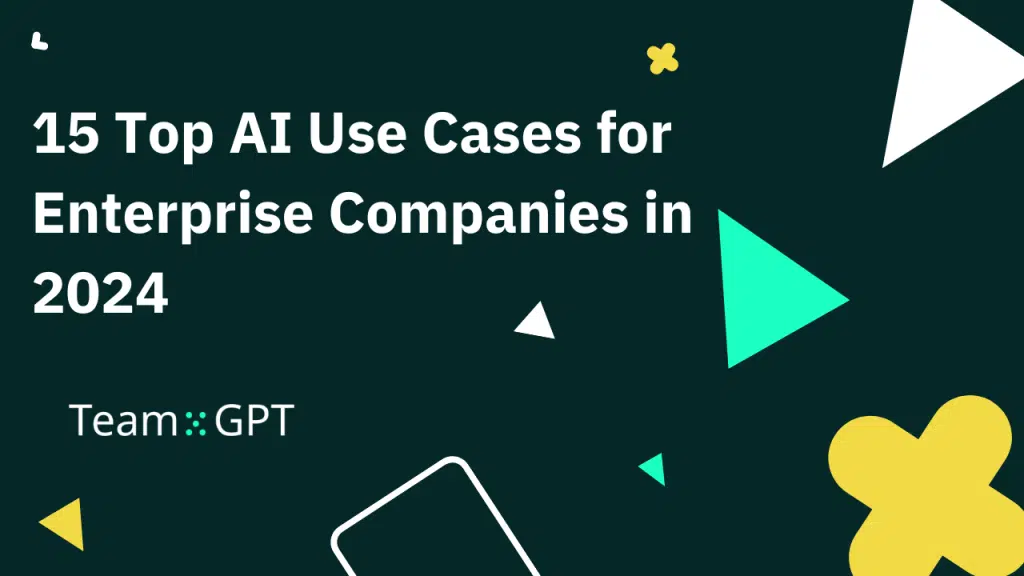Interested in how your enterprise can best utilize AI in 2025?
As AI has got more advanced, I’ve noticed more and more companies looking to adopt it alongside their team to improve their operational efficiency.
In this article, I’ll review 15 use cases of AI, going over how they are used, and what results other organizations are achieving.
Table of contents
- What Are The Best AI Use Cases For Enterprises in 2025?
- #1: Content Generation
- #2: Data Analysis
- #3: Marketing Campaign Planning
- #4: AI-Powered Automation & Workflow Optimization
- #5: Predictive Analytics & Forecasting
- #6: Data Categorization
- #7: Email Inbox Management
- #8: Image & Video Generation
- #9: Large-Scale Personalization
- #10: Customer Service Automation
- #11: Product Recommendations
- #12: Document & Website Search
- #13: Fraud Detection
- #14: Predictive Maintenance
- #15: Topical Research & Education
- Next Steps: Adopt AI Alongside Your Team on Team-GPT
What Are The Best AI Use Cases For Enterprises in 2025?
#1: Content Generation
Content generation is one of the best use cases for enterprise companies in 2025.
AI technology is now capable of:
- Browsing the web to conduct in-depth topic research.
- Structuring content in an SEO-friendly format.
- Using advanced marketing frameworks, such as ‘’PAS’’ (pain, agitation, solution).
- Self-editing its output, humanizing it, and making sure it’s not plagiarizing existing content.
As a result of this advancement in content quality, organizations that use AI for content creation see a 60% increase in productivity and a 30% improvement in content quality.
💡 Tools like Team-GPT (that’s us) let you further improve your content quality and humanize it by creating custom instructions for your preferred AI model (such as ChatGPT or Claude).
Your team can add instructions for brand voice, language, and writing style to make sure that you can scale your content production without having to heavily edit it.
Here’s how you can write articles in about 3 minutes inside of Team-GPT alongside your team:
Alternatively, tools like Jasper AI let you access pre-made writing prompts to write optimized SEO content and offer integrations with SEO tools like Surfer SEO.
Apart from SEO, AI tools can generate social media posts, advertising campaigns, and copy for email marketing.
Case Study: The Washington Post uses AI to produce short-form news reports and updates to scale their content production.
The news corporation has fed an AI algorithm its policies, brand guidelines, and writing styles to ensure quality content output at scale without sacrificing quality.
#2: Data Analysis
Artificial intelligence can enhance your existing data analytics platforms by analyzing large chunks of customer data.
The technology is helping businesses make better-informed decisions about customer needs and marketing and sales performance.
The way it works is that the AI algorithms utilize machine learning to analyze large volumes of customer data to identify patterns and create AI models.
➡️ Instead of hiring data analysts to manually sift through large amounts of data, you can feed your data to a Custom GPT model that can analyze it for you and extract results.
For example, some real estate agents are using generative business intelligence tools like Luzmo to analyze data at scale and provide them with answers quickly.
Additionally, platforms like Google Cloud’s BigQuery ML and Microsoft Azure Machine Learning provide organizations with integrated tools for more advanced data analysis tasks.
Case Study: A client of Trigyn used their AI-powered analytics platform to transform how they interacted with their enterprise data.
The client was able to see a reduction in requests for ad hoc reports, as their employees were able to get instant access to the data they needed, achieving a high adoption rate throughout the company.
#3: Marketing Campaign Planning
You can reduce guesswork and marketing planning time by utilizing AI to help you develop marketing campaigns in minutes.
AI technology helps you plan and launch high-performing campaigns that take care of the brainstorming, content planning, and content creation for you.
There are AI tools like Evercopy that let you share your campaign brief, where you can input your campaign objective, timeline, and features to highlight to further personalize the details.
Example: I tried experimenting with free generative AI tools like Perplexity.
I put detailed explanations of what my email campaign should look like, who I am trying to target, and what my product is about to see what level of output I get:
The tool planned a multi-sequence email campaign that I agree needs some refinement, but it saved me an hour of planning.
To make matters simpler for your team, you can use Team-GPT’s collaborate AI feature to collaborate with your team and build marketing campaigns together.
#4: AI-Powered Automation & Workflow Optimization
AI technology can transform your business with time-saving automations for tasks like data entry and customer service (more on that later).
It can automate and reduce errors in:
- Decision-making.
- Repetitive tasks, such as data entry.
- Data processing, as it enables you to access deeper insights and analysis.
- Complex tasks, such as document processing and customer interactions.
The way AI automation works is that it uses Large Language Models (LLMs) and integrates them with your organization’s proprietary data.
You can familiarize yourself with AI’s 16-step automation workflow in more detail in LeewayHertz’s in-depth article on how AI automation works.
Case Study: IBM utilizes its Robotic Process Automation (RPA) to automate some of its business processes.
The AI algorithm can automate repetitive tasks, such as data entry and transaction processing, improving their efficiency and data accuracy.
#5: Predictive Analytics & Forecasting
One of my favourite use cases of AI is its ability to forecast and predict.
The way AI’s predictive analytics and forecasting work is that it analyzes historical and current data to make educated predictions.
For example, the technology can analyze past sales data alongside market trends to forecast sales in a quarter.
This helps businesses plan for rises in demand, or decreases in demand, to manage their inventories, while online companies prioritize leads effectively and allocate resources.
Case Study: Coca-Cola has implemented an AI sales forecasting system that has improved its forecasting accuracy by over 20%.
This has helped the brand better manage its inventory, predict demand, and think more strategically about its logistics.
#6: Data Categorization
As human error accounts for 75% of data loss, AI data management tools can help you reduce the likelihood of error caused by humans.
AI-powered tools can automatically categorize data based on content and context rather than using pre-defined rules (what it was previously).
This helps your brand handle data better, and save time in the process from manually sifting through thousands of data points.
AI technology uses Machine Learning and Natural Language Processing to learn from data patterns and contexts, enabling the technology to categorize unstructured data with a high degree of accuracy.
Data categorization and classification have their use cases across e-commerce and SaaS brands.
For example, there are e-commerce brands that utilize product recommendation systems where AI categorizes products based on user behavior, preferences, and purchase history.
Case Study: PayPal uses the AI classification tool Simility to flag fraudulent activities for further investigation.
The way it works is that if a credit card transaction deviates from a customer’s spending pattern, the AI model automatically flags it and raises it for manual inspection.
#7: Email Inbox Management
AI helps organizations better manage their leads with automated email chains, saving them time and improving their close rates.
The way it works is that you can set up AI-powered integrations to manage leads, set up automatic replies, and draft responses using generative AI.
Corporations also use AI to detect fraudulent emails and detect spam.
Case Study: Someone I follow on LinkedIn, Sam Bastiaens, shared a cold email inbox automation that he has set up using AI:
The agency founder uses Smartlead to save 1-2 hours of his time every day by automatically managing the cold email inbox and replying to leads.
💡 Sam built this automation in Make, which sends all interested replies from Smartlead to Slack and has ChatGPT draft a response to the lead.
#8: Image & Video Generation
Getting more mature with time, AI technology is also capable of producing images and videos for your brand.
Organizations of all sizes can utilize AI content creation tools like InVideo to create on-brand video content with text instructions.
You can type out a topic and supporting information on what video you need, and the tool will generate a video with script, visuals, subtitles, voiceover, and music.
As for image generation, I’ve noticed brands use DALL-E to generate quality images for marketing campaigns.
The tool is receiving an increased adoption rate by both designers and marketers, as it helps them craft advertising materials and build visuals out of their products.
Case Study: Edelman worked with DALL-E 3, alongside ChatGPT to ideate new physical products to bring to market.
The brand did not replace their designers, but instead used AI as a great starting point to conceptualize new products.
#9: Large-Scale Personalization
AI can also be used to personalize your advertising campaigns, make personalized product recommendations and serve a tailored home page experience.
The way it works is that machine learning algorithms personalize the customer experience based on user behavior on the website and product preferences.
This helps organizations improve their conversion rates and improving customer loyalty.
One of the downsides of deep personalization is that it requires a good amount of customer data to work with.
💡 That means it may not be optimized for first-time users, but online retailers can maximize the value of each returning visitor.
Case Study: Netflix utilizes generative AI to create personalized content previews and thumbnails that are tailored to individual viewer preferences.
The brand’s AI model analyzes user data, viewing habits, and past ratings to make visuals that highlight what would the viewer be most interested in.
#10: Customer Service Automation
Large organizations have been implementing AI-powered chatbots to automate their customer service.
These are post-purchase agents that offer support to existing customers by helping them resolve their problems quicker than they would if they had to wait for a human agent.
For example, Gorgias offers an AI-fuelled customer service chatbot that can resolve up to 50% of customer complaints.
But chatbots are not only useful for the post-purchase customer journey – they can be used to help prospective customers learn more about your products.
These pre-purchase chatbots can answer product-related questions and raise requests to a human agent if the users prefer to speak to a human.
Case Study: L’Oréal has set up conversational AI chatbots to provide their customers with personalized beauty advice and recommend products.
It has coupled its AI chatbot with an AI-powered advisor that can evaluate the users’ faces and provide them with even more tailored recommendations.
#11: Product Recommendations
AI technology is also capable of making product recommendations to new and existing customers.
Online retailers like Amazon have started using AI to recommend products to their customers so they can ensure that each customer is finding the right product for their needs.
The way it works is that AI analyzed behavior data, such as past purchases, and what pages they browsed, to recommend relevant products for each customer.
Tools like Klevu AI provide retailers with product recommendation engines for not only personalized product recommendations but also for tailored up-selling and cross-selling.
Case Study: Amazon has incorporated product recommendations powered by AI in its store to stand out from its competitors and nudge repeat purchases.
The e-commerce giant leverages its customers’ browsing and purchase history to recommend products that their customers are likely to be interested in – starting from the home page.
#12: Document & Website Search
As large organizations have a large depth of data, newer employees, such as sales reps, may struggle to find the information they are looking for, potentially losing on a deal or wasting time.
This is why some corporations with large internal networks have started utilizing AI-powered document search to improve their information discovery.
The AI system provides summaries of search results, can generate detailed answers, and points links to original documents for quick access.
You can feed your PDFs, text documents, and internal infrastructure to a custom-built internal site search by platforms like Salesforce’s Einstein to retrieve the information you need within seconds.
Case Study: Coursera implemented Algolia’s custom-built search to improve their client-facing site search.
The brand also worked on its UX and achieved 30% higher course enrollments from site searches.
#13: Fraud Detection
Fraud detection is one of the less popular use cases of AI in enterprises, but it is a use case to consider.
The way it works is that AI technology uses machine learning to improve cybersecurity with enhanced facial recognition, better authentication, and antivirus detection.
Cybersecurity professionals are training AI models to identify and respond to cyberattacks, detect intrusions, and label events as anomalies for approval by a human.
As cybercrime costs the world $600 billion a year, companies have been trying to train AI to detect anomalies and unusual patterns.
Case Study: Payment card services corporations like Mastercard have levelled up their fraud detection capabilities by deploying AI to detect fraudulent transactions, and discover compromised payment cards.
The brand scans data across millions of cards and merchants, detecting fraud and potentially stolen cards.
#14: Predictive Maintenance
As AI can predict customer demand and potential preferences, the technology can also be utilized in the IT industry to predict when hardware and software are likely to become faulty.
The way it works is that AI can analyze when a server is getting unusually slow and automatically alert the IT team to check if something is wrong.
This helps enterprises spot software and hardware issues quicker and ensure proactive maintenance before it leads to a system failure or a data breach.
Case Study: General Electric (GE) has utilized AI technology to monitor jet engines, predicting maintenance needs before they become a problem.
This has helped the organization improve its jet’s safety and reliability and reduce the risk of something going wrong during flights.
#15: Topical Research & Education
Last but not least, AI technology can be used for researching topics and educational purposes.
From researching a topic to training your sales reps, artificial intelligence can help you synthesize and research information from across the internet and explain it to your team.
You can use tools like Perplexity and ChatGPT to research topics, learn more about complex topics, and educate your team on technical topics.
Example: I used Perplexity to explain what hreflang is in SEO and why it is important.
The tool checked authoritative sources on the internet from Semrush, SEOClarity and Backlinko to provide me with an easy-to-understand answer.
Next Steps: Adopt AI Alongside Your Team on Team-GPT
You can build a custom version of ChatGPT and collaborate with your team on Team-GPT.
Our enterprise AI software lets your team utilize various AI models like ChatGPT, Claude, and Perplexity and customize them to your brand voice and needs.
You can access:
- Real-time collaboration tools.
- A comprehensive pre-made prompt library to create efficient workflows.
- Detailed usage analytics to track employee engagement.
- Enterprise-grade security ensures data privacy and the ability to host the platform on your servers.
Sign up for a demo of the platform today!
Alternatively, you can start for free for up to 2 seats and only pay for OpenAI API credits.

Iliya Valchanov
Iliya teaches 1.4M students on the topics of AI, data science, and machine learning. He is a serial entrepreneur, who has co-founded Team-GPT, 3veta, and 365 Data Science. Iliya’s latest project, Team-GPT is helping companies like Maersk, EY, Charles Schwab, Johns Hopkins University, Yale University, Columbia University adopt AI in the most private and secure way.


